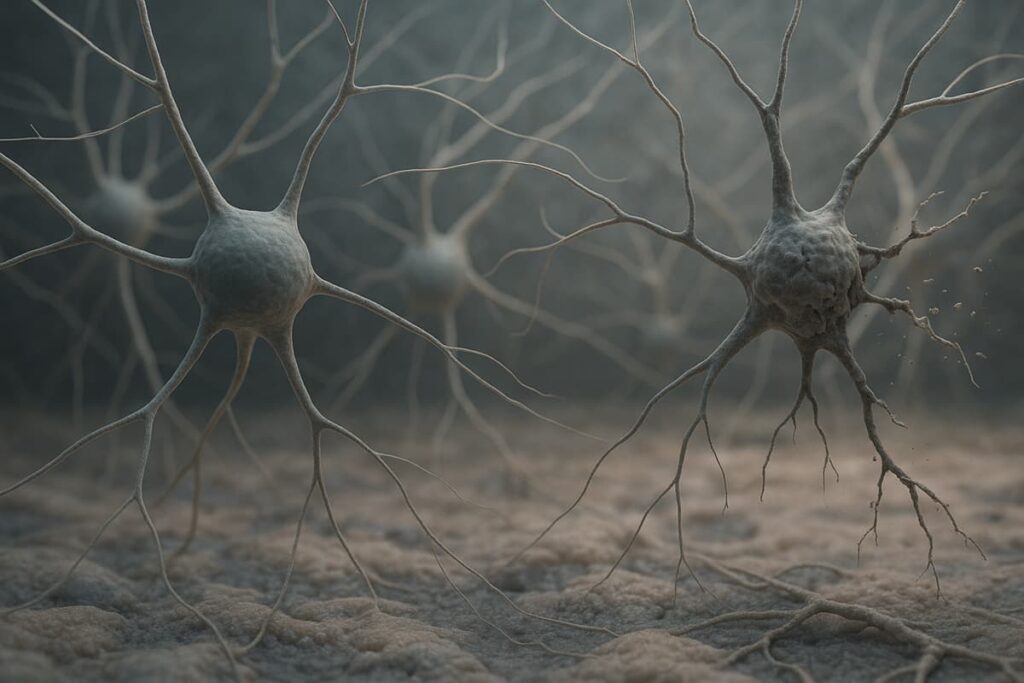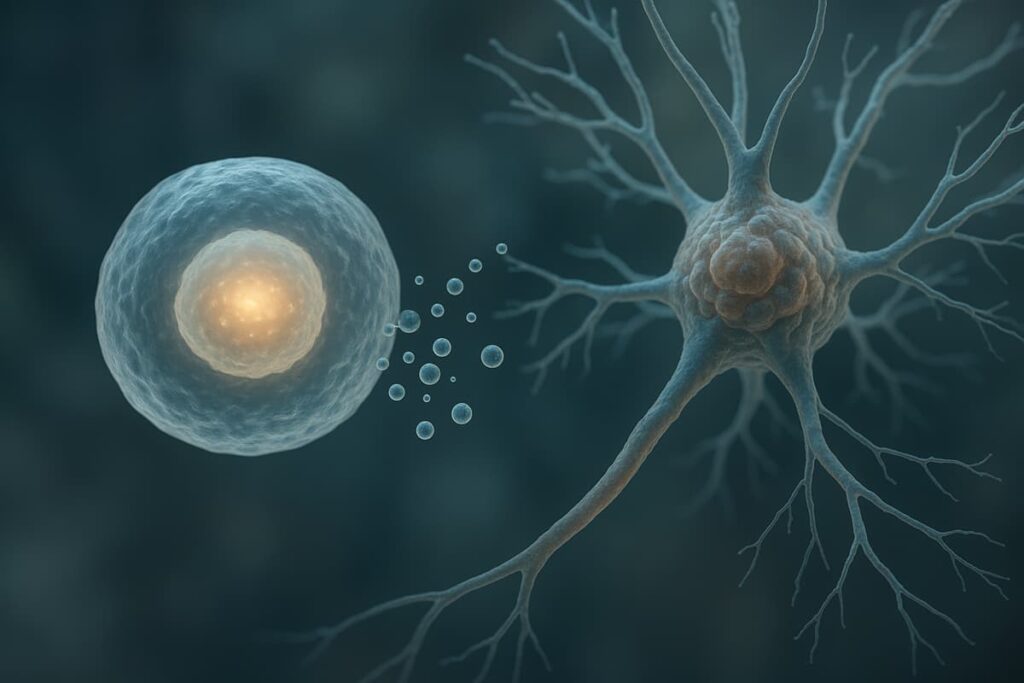Alzheimer’s disease is a progressive neurodegenerative disorder that gradually damages memory, behavior, and cognitive abilities. It affects more than 56 million people worldwide and is the most common cause of dementia.
Despite decades of research, there is still no cure—conventional drugs provide only symptomatic relief. In this context, stem cell therapy for Alzheimer’s disease has emerged as a promising regenerative approach aimed at protecting neurons, reducing inflammation, and improving the quality of life.
At Swiss Medica, we specialize in mesenchymal stem cell therapy for Alzheimer’s disease, focusing on stabilizing cognitive decline, supporting brain function, and helping patients maintain independence for as long as possible.
Understanding Alzheimer’s Disease
Alzheimer’s disease is caused by the gradual death of brain cells, leading to shrinking of brain tissue (atrophy).

Understanding how the disease progresses helps explain why regenerative medicine is being studied as a new therapeutic avenue.
What Causes Alzheimer’s Disease
The main hallmarks of Alzheimer’s disease are the buildup of amyloid-beta plaques and tau protein tangles, which disrupt communication between neurons and trigger chronic inflammation in the brain.
Other contributing factors include oxidative stress, vascular dysfunction, and genetic mutations in different genes. These changes cause neurons to lose their ability to function and ultimately die.
How It Affects Brain Function and Memory
As neuronal connections deteriorate, regions responsible for memory, learning, and emotional regulation are affected first. This leads to difficulty recalling recent events, making decisions, and recognizing familiar people or places. In later stages, patients often experience confusion, anxiety, and personality changes.
Common Symptoms and Stages
Alzheimer’s progresses gradually and typically includes:
- Early stage: mild forgetfulness, reduced concentration, and occasional disorientation.
- Moderate stage: speech difficulties, mood swings, and challenges with daily tasks.
- Severe stage: profound memory loss, dependence on caregivers, and limited communication.
Conventional drugs such as donepezil or memantine may help manage symptoms temporarily. This is where regenerative therapies like stem cell treatment for Alzheimer’s disease aim to make a difference—by supporting the brain’s natural repair mechanisms.
Get a free online consultation
Can stem cells help with Alzheimer’s disease in your specific case?
Our doctors can help you understand what realistic results to expect from therapy and whether it can improve your quality of life. Just fill out the form below.

Medical Advisor, Swiss Medica doctor
What Is Stem Cell Therapy for Alzheimer’s Disease
Stem cell therapy is a branch of regenerative medicine that uses cells with self-renewing and healing properties to restore damaged tissues.
How Stem Cells Act in Neurodegenerative Conditions
Stem cells in Alzheimer’s act through several biological mechanisms that may protect neurons and improve the brain environment.
They do not replace lost neurons directly. Instead, they release signaling molecules—cytokines, growth factors, and exosomes—that protect existing neurons, reduce neuroinflammation, and stimulate the brain’s own repair systems. Studies show that stem cells can improve neuroplasticity and synaptic function, which are essential for memory and learning.
Types of Cells Used in Stem Cell Therapy for Alzheimer’s Disease
At Swiss Medica, stem cell treatment for Alzheimer’s disease involves the use of several well-studied, ethically sourced cell types selected according to the patient’s condition and the therapy’s objectives.
Donor-Derived Mesenchymal Stem Cells (MSCs)
The main component of our stem cell therapy in Alzheimer’s involves donor-derived MSCs from umbilical cord and placental tissue. These cells are collected immediately after childbirth with the donor’s consent in a sterile environment, processed, and thoroughly tested for purity, identity, and safety in our in-house GMP-grade laboratory.
Donor MSCs are preferred because they are:
- Ethically obtained, as collection is non-invasive and uses tissue that would otherwise be discarded.
- Young and biologically active, providing strong regenerative and anti-inflammatory signaling.
- Immunologically well-tolerated, not triggering rejection because they don’t have MHC class II markers.
Every batch is tested for sterility, viability, and genetic stability before use.
Autologous Stem Cells
In select cases, our doctors may recommend autologous stem cells—cells harvested from the patient’s own body, usually from bone marrow or adipose (fat) tissue.
This option may be considered when:
- The patient prefers using their own material;
- Donor-based therapy is not suitable for medical reasons;
- Combined protocols require additional local regeneration support.
Neural Stem Cells
For certain neurodegenerative conditions, including advanced Alzheimer’s, neural stem cells (NSCs) may be introduced alongside MSCs to enhance neuroprotective effects.
NSCs can differentiate into neural lineages under controlled conditions, releasing neurotrophic factors that further support synaptic stability and neuron survival.
At Swiss Medica, neural stem cells are applied only within established safety protocols and always in combination with MSCs—never as a standalone or experimental product.
Their inclusion depends on the patient’s age, disease stage, and individual treatment goals.
Are you interested in the various types of stem cells? Read Swiss Medica’s in-depth article to find out more.
Read articleHow Stem Cell Therapy Works for Alzheimer’s Disease
MSC therapy works by addressing several underlying mechanisms of Alzheimer’s simultaneously—protecting neurons, calming inflammation, and improving communication within the brain.
Supporting Neuron Survival and Regeneration
MSCs secrete neurotrophic factors such as brain-derived neurotrophic factor (BDNF) and nerve growth factor (NGF). These molecules enhance the survival of existing neurons and promote new synaptic connections.
Reducing Inflammation and Oxidative Stress
Chronic neuroinflammation is one of the leading drivers of Alzheimer’s progression. MSCs modulate the immune system by reducing pro-inflammatory cytokines (TNF-α, IL-6) and increasing anti-inflammatory mediators, creating a more favorable environment for brain repair.

Enhancing Communication Between Brain Cells
Stem cells in Alzheimer’s help restore neurotransmitter balance and improve connectivity between neurons. This mechanism contributes to better focus, memory, and emotional regulation—key factors in maintaining a patient’s independence.
Clinical Outcomes and Reported Benefits of Stem Cells in Alzheimer’s
Both research and our clinical experience demonstrate that stem cells in Alzheimer’s can improve multiple aspects of patients’ lives. The stem cell therapy success rate depends on disease stage, patient age, and general health.
According to published studies and feedback collected from Swiss Medica patients and their families, the most frequently observed benefits include:
- Improved attention and verbal communication.
- Stabilized mood and reduced anxiety.
- Enhanced sleep quality and emotional balance.
- Increased participation in daily activities.
A 2023 meta-analysis reported cognitive improvements and lower inflammation markers in 70% of Alzheimer’s patients treated with MSCs.
While stem cells for Alzheimer’s patients cannot completely reverse the disease, they can support brain function and help slow progression, offering hope for a better daily life.
Safety, Risks, and Limitations
At Swiss Medica, patient safety is our top priority. Our stem cell transplant for Alzheimer’s uses only adult MSCs from ethically sourced donor tissues.
All procedures are performed under EU GMP–grade standards and strict sterility protocols.
Safety highlights:
- No embryonic or fetal cells are used.
- Donor screening includes HIV, hepatitis B/C, CMV, and other pathogens in accordance with EU medical standards.
- Every batch of cells undergoes genetic stability and sterility testing.
- Individualised dosing helps to avoid vascular overload and adverse reactions.
Curious about how stem cells are processed and prepared for therapy? Discover the advanced technologies and quality standards behind Swiss Medica’s laboratory work.
Explore our laboratoryMinor side effects such as mild fatigue, dizziness, or low-grade fever may occur temporarily after treatment and resolve within 24 hours.
Is the Therapy Safe for Elderly Patients?
Alzheimer’s stem cell therapy is well-tolerated in elderly individuals and rarely triggers immune rejection. Each case is reviewed individually to confirm safety before therapy begins.
The Swiss Medica Treatment Process
Swiss Medica offers a structured, patient-centered approach to treating Alzheimer’s with stem cells. Each stage is supervised by experienced regenerative medicine doctors.
The process begins with a detailed medical review, neurological exam, and laboratory tests to confirm eligibility and ensure the therapy’s safety.
Cells are cultivated in Swiss Medica’s in-house laboratory and tested for viability, purity, and potency before administration.
Depending on the patient’s needs, MSCs are administered intravenously or intrathecally. Complementary therapies such as secretome or IMR may be included to enhance the regenerative effect.
Throughout the stay, patients receive constant medical supervision. After treatment, remote consultations help track cognitive and functional improvements.
Treatment typically lasts 5–9 days at the clinic, followed by optional exosome or physiotherapy programs at home.
What to Expect After Stem Cell Therapy
Many patients wonder, can stem cells reverse Alzheimer’s disease?
Although complete reversal is not possible, stem cell therapy can slow the rate of neurodegeneration and help preserve memory and attention for longer. Improvements usually develop gradually, with stabilization of mood and cognitive clarity.
The goal of stem cell therapy for Alzheimer’s disease is to slow neurodegeneration and help the brain maintain its functional activity as long as possible.
1. Preserving memory and attention
Stem cells help protect existing brain cells and improve their communication, which may slow memory loss and make it easier to concentrate or follow conversations.
2. Stabilizing emotions and behavior
Many patients and families notice a calmer mood, fewer episodes of irritability or anxiety, and a more balanced emotional response after therapy.
3. Supporting cognitive function
By creating a healthier environment for brain activity, mesenchymal stem cell therapy for Alzheimer’s disease can contribute to better orientation, decision-making, and language skills, helping patients stay engaged in familiar routines.
4. Increasing energy and alertness
Improved circulation and oxygen supply to the brain often lead to higher energy levels and reduced fatigue during the day.
5. Enhancing overall quality of life
As symptoms become more manageable, patients tend to sleep better, communicate more easily, and maintain independence for longer, which significantly improves daily comfort for both patients and caregivers.
For most patients, the peak effect is seen between 3 and 6 months. Some choose to repeat stem cell treatment for Alzheimer’s after 6–12 months to maintain benefits.
Contact us
Not sure if this therapy is suitable for your condition?
Share a few details about your case, and our specialists will provide personalized guidance.

Medical Advisor, Swiss Medica doctor
Patient Experience
Many families notice meaningful changes after treatment. You can find numerous patient testimonials on the official Swiss Medica YouTube channel, where relatives share their experiences and results after stem cell therapy for Alzheimer’s disease.
One family shared that their elderly relative, who had been living with Alzheimer’s for several years, became noticeably calmer and more responsive after undergoing therapy at Swiss Medica.
“Before the therapy, she barely spoke,” recalls the patient’s daughter. “Now she greets us when we enter the room, asks simple questions, and even remembers small things from our conversations. For us, that means everything.”
Why Patients Choose Swiss Medica
Swiss Medica has been providing regenerative medicine treatments since 2011, combining clinical precision with compassionate, patient-centered care and affordable stem cell injection costs. Founded in Switzerland and now based in Belgrade and Slovenia, Swiss Medica continues to expand access to advanced biological therapies for patients worldwide.
Our mission is to deliver safe, evidence-based regenerative programs that help patients improve their quality of life when standard treatments are no longer effective.
Our key advantages:
13+ years of experience in regenerative medicine.
We are among the pioneers in the use of stem cell therapy for Alzheimer’s disease and other neurodegenerative disorders. Our protocols are continuously refined based on scientific data and patient outcomes.
Focus on complex neurological and autoimmune conditions.
Swiss Medica specializes in diseases such as Alzheimer’s, Parkinson’s, multiple sclerosis, and ALS, where stem cell therapy may help stabilize function and delay progression.
In-house GMP-grade laboratory and cryobank.
All stem cell products used in therapy are processed, tested, and stored in our own certified laboratory, ensuring full control over safety and quality. This eliminates risks associated with external labs or transportation.
Advanced medical facilities.
Our modern hospital in Belgrade covers over 10,000 m² and is equipped for diagnostics, cell therapy, and rehabilitation.
The environment is designed for comfort, with hotel-level patient rooms and full accessibility for people with limited mobility.
24/7 medical care and individual monitoring.
Patients receive continuous supervision, from pre-treatment assessment to post-therapy follow-up. Our doctors remain in contact after discharge to evaluate long-term results.

Ethical sourcing and full transparency.
All donor cells are obtained from healthy, screened mothers after childbirth. The process is fully ethical, noninvasive, and complies with European medical regulations.
About the cost of therapy
The price of stem cell treatment for Alzheimer’s disease depends on the patient’s diagnosis, stage of disease, and the number of cell products required. Each program is personalized after a full medical review.
Generally, the cost of Alzheimer’s stem cell therapy ranges between €7,000 and €31,000*, which includes:
- Full diagnostic evaluation before therapy;
- Stem cell preparation and administration;
- All complementary procedures (exosomes, secretome, or IMR if recommended);
- Accommodation, meals, and airport transfer;
- Post-treatment follow-up consultations.
Patients appreciate that Swiss Medica offers affordable stem cell therapy options without compromising on quality or safety. All costs are discussed in detail during the initial consultation, so patients can make informed decisions before booking.
*Prices are indicative, based on January 2025, and may vary with condition severity and cell quantity required.
Getting Started with Treatment
To begin stem cell treatment for Alzheimer’s, schedule a free online consultation with our medical experts. Our team will review your case, determine whether it is suitable, and outline a personalized treatment plan.
Patients can discuss all details, including procedure type, travel, and estimated cost, directly with the consulting doctor.
Contact us
Find out if stem cell therapy for Alzheimer’s disease is right for you—fill out the form below and our regenerative medicine specialists will contact you today.

Medical Advisor, Swiss Medica doctor
FAQ
1. Can stem cells cure Alzheimer’s disease?
No. While stem cell therapy for Alzheimer’s disease cannot completely reverse or cure the condition, it may help slow progression and improve quality of life by reducing inflammation and supporting brain repair.
2. How soon can results appear?
Most patients notice subtle improvements within 1–3 months. The full benefit usually develops after several months as regenerative processes take effect.
3. How many treatments are needed?
Typically, one cycle of stem cell treatment for Alzheimer’s lasting 5–9 days is sufficient. Repeating therapy after 6–12 months may help maintain results.
4. How are stem cells used to treat Alzheimer’s disease?
Stem cell transplants for Alzheimer’s are introduced intravenously or intrathecally to reach the central nervous system, where they release anti-inflammatory and neuroprotective molecules.
List of References:
Wang, Y., Yi, H., & Song, Y. (2021). The safety of MSC therapy over the past 15 years: a meta-analysis. Stem Cell Research & Therapy, 12, 545. https://doi.org/10.1186/s13287-021-02609-x
Liu, H., et al. (2024). Mesenchymal stem cell therapy in Alzheimer’s disease: current evidence and future directions. Progress in Neurobiology, 239, 102428. https://www.sciencedirect.com/science/article/abs/pii/S0306452224003324
Yin, L. et al. (2023). Therapeutic potential of MSCs in Alzheimer’s disease: A systematic review and meta-analysis. Stem Cell Research, 67, 103074. https://pmc.ncbi.nlm.nih.gov/articles/PMC7477654/
Kim, H.J. et al. (2021). Mesenchymal stem cells promote neuroplasticity in models of cognitive impairment. Frontiers in Cellular Neuroscience, 15, 663724. https://pubmed.ncbi.nlm.nih.gov/33978317/
MD, Pediatrician, Regenerative Medicine Specialist









